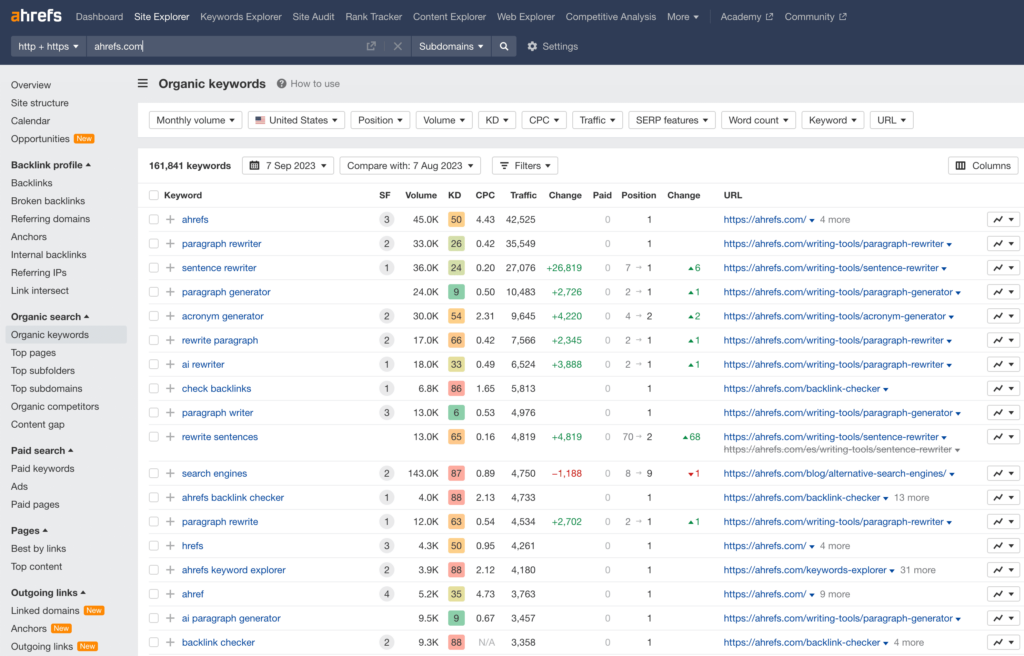
One of the fundamental aspects in SEO that often determines the success of your online presence is the strategic use of keywords. Keyword mapping involves connecting the dots between the keywords you target and the content you create. By effectively mapping your keywords, you can optimize your website for search engines and improve your visibility, driving more organic traffic to your digital domain.
Understanding the meaning of keyword mapping in SEO is essential to implementing a successful strategy. The purpose of this article is to introduce you to the concept, benefits, and steps of keyword mapping, helping you use this technique to improve your website’s performance in search engine results.
So, let’s uncover the secrets behind effective keyword mapping in SEO.
What is Keyword Mapping in SEO
Keyword mapping is an integral part of any successful SEO strategy. It involves the process of linking the keywords you are targeting to specific pages or content on your website. By matching relevant keywords to specific pages, you can provide content optimization for search engines and improve its visibility in search results.
Think of keyword mapping as a roadmap to help search engines and users find the most relevant content on your website. By strategically matching keywords, you create a clear and organized structure that makes it easier for search engines to index your pages and understand the value they provide to users.
By mastering the art of keyword mapping, companies can align their content strategy with the queries users enter into search engines. This practice not only improves organic visibility, but also boosts user engagement and drives quality traffic to your site. Our search engine optimization company can provide you with professional support in this process.
The Benefits of Keyword Mapping Strategy
Implementing a well-structured keyword mapping strategy can bring numerous benefits to your SEO efforts and overall website performance. Let’s take a look at some of the key benefits of using this approach:
- 1. Elimination of Keyword Cannibalization
Keyword cannibalization occurs when multiple pages of your website target the same keywords, causing them to compete with each other in search engine rankings. This can confuse search engines and hurt your visibility. However, by using a SEO keyword mapping strategy, you can assign specific keywords to each page, ensuring clarity and avoiding keyword duplication. This eliminates cannibalism and allows each page to rank optimally, increasing the likelihood of attracting targeted traffic.
- 2. Identification of Content Gaps
Effective keyword mapping involves doing thorough keyword research in your industry or niche. By analyzing these keywords and mapping them to relevant pages, you can discover content gap examples on your website. These gaps present valuable opportunities for creating new targeted content or optimizing existing pages to cover these topics. Filling in these content gaps not only increases the relevance and completeness of your website, but it also opens up opportunities to drive more organic traffic from untapped keyword variations.
- 3. Enhanced User Experience
A well-implemented keyword mapping strategy takes into account the intent of each keyword. By understanding the search intent of users, you can ensure that the mapped keywords match the content found on the respective pages. This alignment provides a great user experience because visitors will find exactly what they are looking for when they visit your site. Satisfying user intent improves engagement metrics such as bounce rate, time on site, and conversion rates, signaling to search engines that your website provides valuable information.
- 4. Improved Organic Rankings
When you strategically map keywords to specific pages, you increase the relevance and up-to-date authority of those pages in the eyes of search engines. This targeted approach helps search engine algorithms understand the purpose of each page, making it more likely to rank higher in relevant search results.
As your pages climb in the rankings, you will gain increased organic visibility, attracting targeted traffic that is more likely to convert.
- 5. Targeted Traffic Generation
Keyword mapping allows you to align specific landing pages with the most relevant keywords. This alignment attracts qualified visitors who are actively searching for information related to those keywords. By tailoring your content to suit their search terms, you increase the chance of grabbing their attention and driving targeted traffic to your site. This targeted traffic has a higher potential for engagement, conversions, and ultimately business goals.
When you implement a comprehensive keyword mapping strategy, you can unlock these benefits and propel your SEO efforts towards success.

How to Do Keyword Mapping
To effectively carry out keyword mapping, it is important to follow a systematic process that ensures the best match between keywords and web pages. Below we describe a step-by-step approach to help you successfully complete the keyword mapping process.
Keyword Research and Analysis
First, you need to do keyword research you want to rank for. It must be in response to a specific request. You can collect relevant keywords from different sources: tools, content gap analysis, competitor keyword analysis, etc.
Also, you should find out what queries your pages are currently ranking for. To do this, use the Google Search Console tool – it gives analytical data on which keys and in what positions each page of the site is currently ranked.
Keyword Clustering
Keyword clustering, also known as keyword grouping, forms the foundation of effective keyword mapping. This process involves organizing related keywords into clusters based on their semantic similarity and search intent. By grouping keywords together, you can identify themes or topics that will guide your content creation and website structure.
Keyword Intent Mapping
Understanding the user’s intent behind specific keywords is critical for successful keyword mapping. Analyzing the intent allows you to match the right content with the right keywords, delivering relevant information to users. Evaluate each keyword and determine its intent — whether it’s informational, navigational, transactional, or commercial. This insight helps you align the appropriate landing pages with each keyword cluster, ensuring the best user experience and increasing the chances of conversion.
Mapping Keywords to URLs
Once you have clustered keywords and determined their intent, the next step is to map them to specific URLs within your website. Each URL should be assigned one or more focus keywords that accurately represent the content on that page. Avoid assigning the same keyword to multiple pages to prevent cannibalization. Instead, aim for a diverse keyword distribution that covers your target topics comprehensively.
Planning website structure
As you map keywords to URLs, consider the hierarchy and structure of your website. Higher-level categories should address broader keyword clusters, while subcategories and individual pages cater to more specific keyword variations. This hierarchical approach helps search engines understand the organization of your content and improves the overall relevance of your website’s pages.
Analyzing Search Intent
Analyzing search intent goes hand in hand with keyword mapping. Take the time to understand why users are searching for particular keywords and what they expect to find. Are they looking for information, product comparisons, or solutions to a problem? Matching the search intent with the content on your mapped pages helps ensure a seamless user experience and increases the likelihood of satisfying their needs.
Optimizing Content for Keywords
Once you have mapped keywords to specific URLs, it’s essential to optimize the content on those pages. Incorporate the assigned focus keywords naturally into your content, including headings, subheadings, and body text. However, remember to prioritize user experience and readability above keyword density. Craft high-quality, informative content that addresses the user’s search intent while integrating the mapped keywords strategically.
Monitoring and Adjusting
Keyword mapping is an ongoing process that requires monitoring and adjustment. Regularly review your keyword map and analyze how your web pages are performing in search engine rankings. Use tools like Google Search Console to gather data on keyword performance, click-through rates, and impressions. Make adjustments to your keyword mapping strategy as needed based on these insights to continuously improve your SEO efforts.
Additionally, leveraging keyword research tools can assist you in identifying relevant keywords, analyzing search volume and competition, and refining your keyword mapping process.
Keyword Mapping Tools
To streamline your keyword mapping process and gain valuable insights, several powerful tools are available in the market. These tools offer features such as keyword research, competitive analysis, search volume data, and more. Let’s explore some of the most popular tools used for keyword mapping:
- • Semrush: Semrush is an all-in-one SEO tool that offers comprehensive keyword research capabilities. With its Keyword Magic Tool, you can discover relevant keywords, analyze their search volume, and identify keyword variations. Semrush also provides competitor analysis, backlink audits, and site auditing features, making it a valuable tool for your keyword mapping needs.
- • Ahrefs: Ahrefs is renowned for its robust backlink analysis and keyword research capabilities. It allows you to explore keyword ideas, analyze search volumes, and assess keyword difficulty. Ahrefs’ Content Gap feature enables you to identify keyword opportunities by comparing your website to competitors. Additionally, its Site Explorer tool provides valuable insights into your website’s organic search performance.
- • Moz: Moz offers a range of SEO tools, including Moz Keyword Explorer. This tool helps you find relevant keywords, analyze their difficulty, and uncover search volume data. Moz also provides features like Rank Tracking, On-Page Grader, and Link Explorer, which complement your keyword mapping efforts and overall SEO strategy.
- • Google Keyword Planner: Google Keyword Planner is a free tool offered within Google Ads. While primarily designed for PPC campaigns, it provides valuable keyword insights for SEO purposes as well. You can discover new keyword ideas, assess search volumes, and understand keyword trends using this tool.
- • KeywordTool.io: is a popular keyword research tool that generates keyword suggestions from various sources, including Google Autocomplete. It provides keyword ideas for different platforms, including Google, YouTube, Bing, Amazon, and more. It offers valuable insights to enhance your keyword mapping process.

These are just a few of the many keyword mapping tools available in the market. Depending on your specific requirements and budget, you can explore these tools and others to find the one that best aligns with your needs.
While these tools offer valuable data and insights, it’s essential to combine their findings with your own research and analysis to create an effective keyword mapping strategy tailored to your website and target audience.
Creating a Keyword Map: Final Thoughts
Creating a well-structured keyword map is a critical step to measure SEO performance of your website and optimize it to drive targeted organic traffic. By following the steps in this guide, you can effectively link keywords to specific pages and increase the overall relevance and visibility of your content.
At Mellow Promo, we understand the importance of effective keyword mapping and its impact on SEO success. Our team of experienced SEO professionals is dedicated to providing top-notch keyword research services to help you achieve your online objectives.
With our comprehensive keyword research services, we leverage advanced tools and techniques to identify relevant keywords, analyze search volumes, assess competition, and uncover valuable insights. Whether you need assistance with keyword clustering, intent mapping, or mapping keywords to URLs, our experts will guide you through the process, ensuring a strategic and data-driven approach.
Partnering with Mellow Promo for your keyword research needs ensures that you have access to industry-leading tools, expertise, and personalized guidance. By leveraging our services, you can optimize your website’s performance, increase organic visibility, and attract the right audience to achieve your business goals.
Get in touch with us today and let us help you create a powerful keyword map that drives results!





